March-April 2001
Cross That Line...And You’re Dead!
By Gee-Gee O. Torres
When we sent our assistant editor to Korea to meet the 40 or so Pinoy missionaries there we never realized that she would be arriving at a very historic moment in that divided land – divided since the terrible Korean War of the 1950’s. At last the first light of reconciliation seems to be dawning. Gee-Gee Torres shares with us her firsthand account of this momentous event.

August 15 marked a historic milestone in Korea last year. Some 100 North Koreans went to the South and an equal number of South Koreans went to the North to be reunited with their longlost relatives. For 50 years they had never heard from each other – no letters, no phone calls, no nothing. They were victims of the Korean War in the early 1950’s, a bloody civil war which divided not only the nation but also the people. Hundreds and thousands of individuals lost their homes, but what’s much more painful was that they were torn apart from their loved ones. Some relatives ending up in the democratic South and others, the less lucky one, in the communist North.
“What really happened to Korea?” I asked myself. I felt I had to know more about their history to understand the challenges our Filipino missionaries are facing in this land called the Hermit Kingdom. The pressure from the foreign powers was just too much to take that Korea closed its borders to all foreigners in the late 19th century.
When I went to Khangwa Island to visit our Augustinian missionaries I had the opportunity to watch the history of Korea unfold right before my eyes. I was supposed to take my siesta, but the Korean summer afternoon was too humid to be able to dose off. I went to the living room instead and joined Fr. Arlon Vergara, OSA as he watched the live coverage of that historic event, the reunion of families from North and South, on television.
As I watched I couldn’t help but feel for them. I was deeply moved when I saw a middle-aged man visiting his frail, aged mother in the hospital. They embraced each other as if never wanting to let go. Tears rolled down their cheeks. Their faces mirrored the longing of a mother to hold her son and the yearning of a son to be with his mother. After fifty long years, a life-long dream was coming true. When it was time for the son to go, it was so painful for me to hear the mother begging her son not to leave her again and to watch her son go reluctantly, feeling helpless.
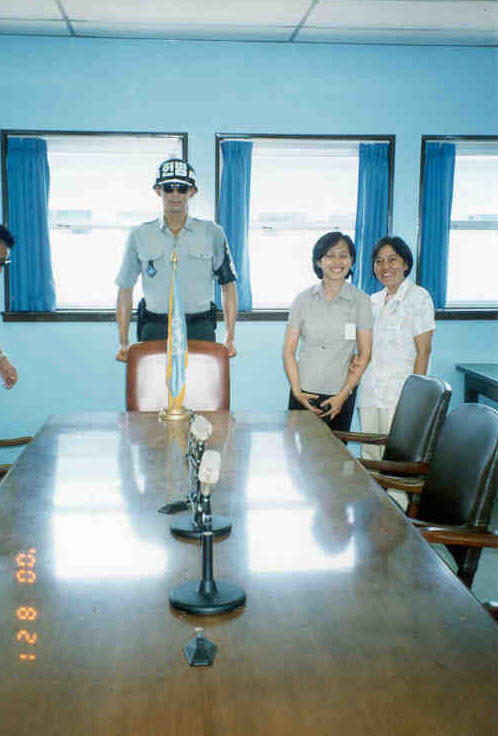
Rheena and Mador posing beside the South Korean soldier
My mind drifted back to my childhood days when we would spend our summer vacation in the hometown of my Mom in Pampanga. I always looked forward to be with our Lolo Ambo. I enjoyed watching him dip his pandesal in his coffee every morning while his pet cats joined him for breakfast. Then I would sit beside him at the balcony as he told me stories. However when our summer vacation was about to end I would avoid joining Lolo at the breakfast table or at the balcony. Slowly I distanced myself because I always found it difficult to say goodbye to him. But anyway I could always write him and tell him that I’d see him next summer. But how about the mother and son I saw on TV? It must be doubly hard for them. They have been separated for half a century because of the Korean War and now that they have found each other, once again they have to go through the agony of being separated. The pain could be more bearable if only they had a means of communicating with each other like my Lolo Ambo and me, but up till recently letters and phone calls have not been allowed.
Days after I watched that event on TV, I found myself with Mador and Rheena, two of our Filipina lay missionaries, boarding the tour bus headed to the Demilitarized Zone (DMZ) and Panmunjom, about 56 kilometers north-west of Seoul. We were going to get a glimpse of the forbidden North and Panmunjom is the only place in South Korea along the DMZ where we can get quite so close to North Korea without being arrested or shot. Panmunjom is the truce village on the ceasefire line at the DMZ. Following the Korean War, the DMZ, a 250 kilometers long, 4 kilometers wide no man’s land, strewn with landmines and the world’s most heavily armed border, was set up and has separated the two Koreas since then.
After almost 2 hours we reached Camp Bonifas. At this point I felt the tension in the air. A soldier came up into the bus and inspected our passport. He escorted us into the camp and strictly told us, “No picture taking until advised to do so.” I was tempted to take pictures of the camouflaged bunkers, tanks and artillery but on second thought I decided not to lest I get arrested in the Camp. We had lunch at the commissary and then we proceeded to the lecture room where we were given a slide presentation and briefing by American soldier Stacey, our guide at the DMZ. He asked us to sign a waiver that in case of any untoward incidents they would not be held responsible for us. On our way out of the lecture room, we donned our visitor’s IDs and, escorted by Soldier Stacey, our group boarded a military bus going to the Joint Security Area of Panmunjom. I realized that this wasn’t an ordinary tour at all. Should war break out during our visit, we’d surely get caught in the crossfire.
When we arrived at the Joint Security Area, I stayed close to Soldier Stacey and listened well to his instructions. Stern-looking South Korean soldiers were everywhere. They looked like mannequins standing inside and outside the buildings, but they seemed to be watching our every move, on the alert, making sure that nobody goes near the demarcation line. Across the line was already the communist North. “Cross that line and you’re dead,” Soldier Stacey said as he pointed to us the North Korean guard, watching us closely with his telescope from the other side. Then he directed us to enter a room. We went inside the very room where the endless armistice talks go on. There was a long table in the middle of the room. I was amazed when our guide told us that half of the table belongs to the South and the other half to the North. When Soldier Stacey said we can transfer to the other side of the table Mador, Rheena and I eagerly grabbed our once-in-a-lifetime chance to go to North Korea.
On our way back to Camp Bonifas, I took a last look at the surroundings. It seemed serene but in reality there was tension existing, war could break out anytime. From the bus, we saw the famous Bridge of No Return where prisoners of war were commanded to choose between the North and the South; once they had crossed the bridge it was closed forever. But I believe, in the light of today’s ongoing talks between the governments of the North and the South, in the not too distant future the man I saw on TV will find his way home back to his mother across this bridge. And surely our Pinoy missionaries will soon find themselves following.
Father Joeker

By Fr Joseph Panabang SVD
Women: I’ll never get it right
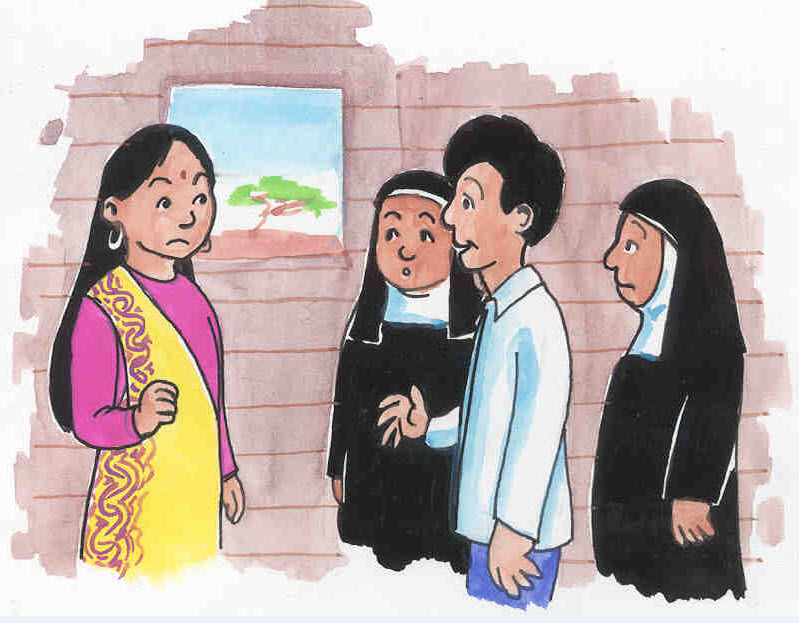
Sr. Sheela, SSpS from India was visiting the SSpS Sisters in Sunyani. They brought her to Wenchi. Entering the house she came so beautifully dressed in Indian style, she looked like Indira Gandhi, so elegant. Without waiting, I greeted her saying, “Today you so are well-dressed.” "So, yesterday I was not well-dressed?” she countered, not looking very pleased. Maybe I should start taking lessons on 'the art of giving compliments’. Women: I’ll get it right.
Sports commentator wannabe
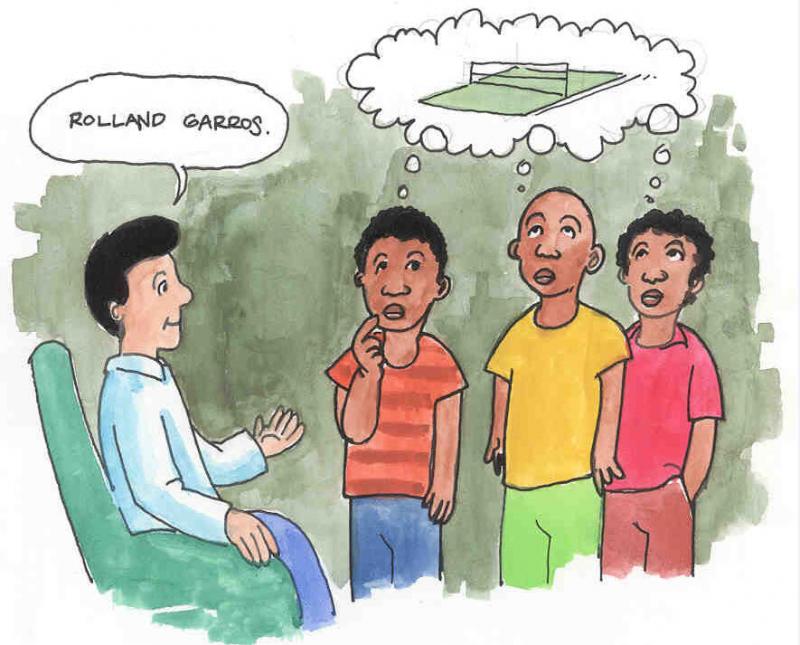
I watched the tennis star Agassi in his final match in the French Open Championship on TV. Asked by my friends who where not able to watch how the game went, I described it the way I saw it: Rolland Garros is good but when Agassi goes to the net, he panics.” I did not know that Roland Garros was the name of the tennis court venue. Seems I don’t have the vocations to be a sports commentator.
The Lucky Pig
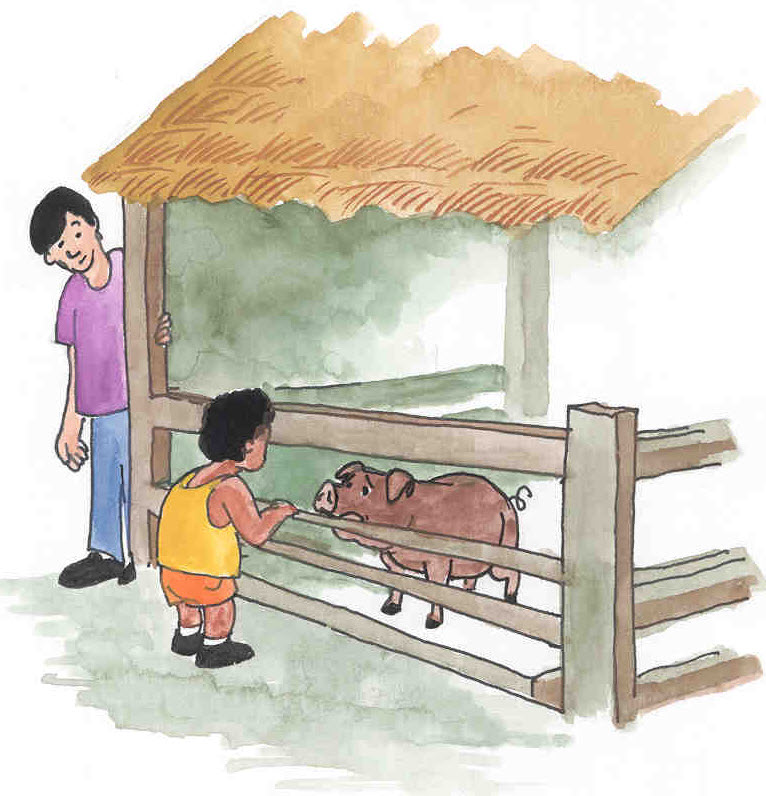
I went to our piggery to choose one pig to be sold. I pointed out the ‘lucky pig’ to Jara, our assistant, and said, “This one you must kill today and bring to the market.” As I was getting out of the piggery, I overheard him talking to the pig. “Enne, obeko heaven.” (Today you shall go to heaven.)
Stuck duck
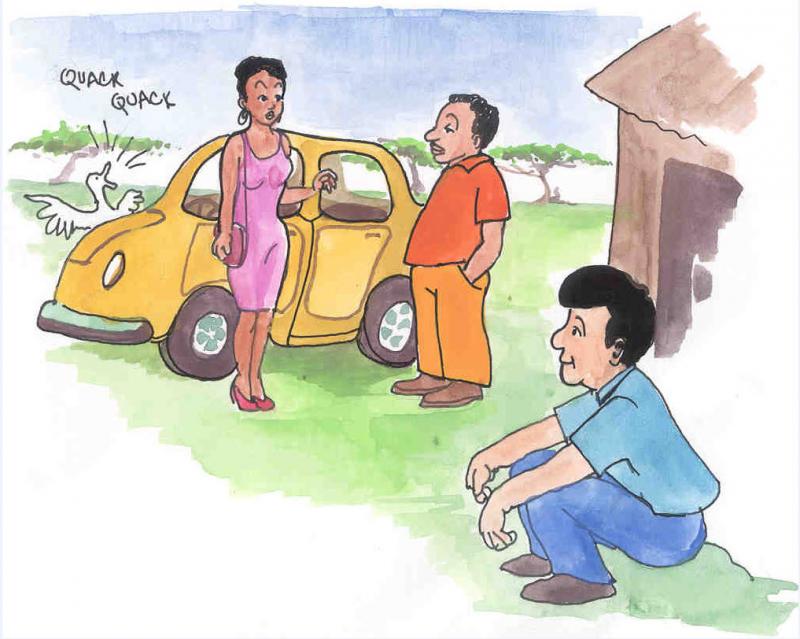
I was at Mr. Fletcher’s mechanic shop in Accra waiting for my car to be repaired when a well-dressed woman came in complaining about her car, “Mr. Fletcher, I do not know what is wrong with my car. I hear a quack-quacking noise.” “Mr. Fletcher,” I interrupted, trying to sound serious, "try checking out the hood, there might be a duck stuck in there.” When I glanced to her she looked annoyed. Mr. Fletcher had to immediately tell her I was only kidding.
Goodbye Angola
By Fr. Efren de Guzman svd
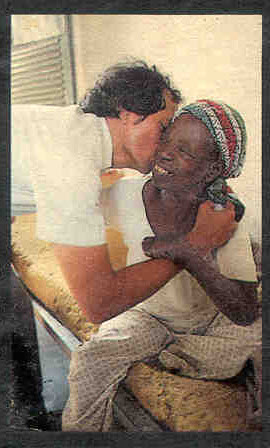
After 20 years of serving in Angola, working with the lepers, some encounter with the danger of death, plus the occasional bouts with loneliness in that far, isolated land, I am now moving on to a new assignment; I will be working with the Jesuits and members of other congregations and lay people in East Timor. Similarly, the main thrust of my life will be on community development. As much as I wouldn’t want to leave Angola and the life will be on community development. As much as I wouldn’t want to leave Angola and the life with the people there I have loved through the years, I have to answer God’s call for me to go to another land. And in my heart I believe God will take care of the people I am leaving behind.
What is the situation in East Timor today? After 24 years of Indonesian oppression and violence in East Timor, a referendum was held on August 1999. it was preceded by terrorization and killing of East Timorese people by Indonesian militia groups to persuade them to vote for integration into Indonesia. The militias destroyed 70% of the buildings, fields and livestock and at the same time forcefully evacuated into West Timor (part of Indonesia) between 250, 000 and 300, 000 East Timorese – some 40% of the population of whom hundreds, perhaps thousands, were killed.
The result of this brutality are psychologically and physically ruined lives and a divided people; those bribed to be pro-Indonesian are now exiled from their homes and too scared to return and those who have chosen to stay at home are angry about the losses they suffered in 1999. The United Nations Transitional Authority in East Timor is the official interim government, which consults with the National Council of Timorese Resistance, which is regarded as the vice of the Timorese people. UN agencies, foreign and local NGO’s are in East Timor to help keep the peace, establish government, keep the people alive with food, supply shelter, open health clinics, retrieve deportees from West Timor lack qualifications, skills and experience. The country needs civil servants, agricultural advisers, teachers, builders, economists, police, doctors, nurses. And I am glad I am here, a missionary.
“His love for us never lets us down, leads us to trust him in our troubled world. O blessed assurance! The glory of his presence, rich and full for all eternity...?
He Showed Himself Through Cigarettes
A continuation of an interview with a Russian dissident, Alexander Ogorodnikov
In the last issue, we told the story of how Alexander Ogorodnikov, an atheist, found his way to God and to the Church. At first the devout Christians could not believe that he was genuine. But they accepted him and then he began to spread the Goodnews fearlessly-resulting in many strange events. One of which we recount here.

What happened after your first Communion that day in Moscow?
My friends also started going to church and participating in church life. But we encountered a new problem. It seemed to us that the church as an institution was not ready to accept us. The priests were afraid of us, and not only the priests. I went to a church of Kazan and when I entered an old babushka tried to push me out. She thought that since I was a young man, I must be a representative of the government or the Konsolmol [the young Communist association] who had to come to provoke them in order to shut down the Church. At that time young people did not go to Church. She was protecting their church against me, or my kind. It was not easy to stay! But when the old women saw that I went to confession and I received communion, they all cried. At the end they all came and they wanted to kiss me and thank me. It was a powerful experience - they saw a new generation coming into the church.
Place for us
We young people found ourselves in a very complex situation. It was difficult to find a place for ourselves inside the church. There was no living community and no education. We were trying to find out what were the possibilities, what could we do in this world as Christians, as Orthodox Christians.
In this kind of schizophrenic situation, we could only pray while we were in church, and then it was like leaving our belief in a kind of waiting room. It was difficult for us to understand because the reason we came to church was because it was truth, but outside the church we had to go on living as Soviet citizens. This being torn apart was very difficult. We came to church because here was the True Light. That’s why we started the Christian Seminar Retreat, because we couldn’t live with this church which was silent.
Search for Kitezh
The Seminar helped us to start a living Christian community and also to educate us in Orthodox belief. Then we started to travel all over Russia in what we called our search for the invisible town of Kitezh. Kitezh is a fabled place miraculously preserved under the waters of the Svetloyar Lake where the old way of life and worship has continued without pause. According to the legend, occasionally Kitezh rises from the water and appears to the devout. To “search for Kitezh” is a way of speaking in metaphors about the search for holiness. Little by little we were discovering the spiritual life in Russia. It was hidden, but it started to open to us. We didn’t want to remain just a small intellectual circle of Orthodox youth. We found monks and nuns who helped us. Now today we can openly talk about this, how in the Ukraine, at the Pachaiev monastery, they helped us in other ways. They gave us money and helped us buy a house for the Seminar. We declared that house to be kind of free territory, not part of the Soviet Union, a liberated territory. Of course, the authorities paid us back and they declared us to be forbidden zone, we were actually provoked, persecuted
Threatened
One day I was called to Moscow by the KGB. Five strong men from the KGB put me in a car and drove out of the City. The car stopped in the middle of the forest and I was thrown out of the car. They put me against the car and encircled me, holding guns in their hands. At that moment, someone in a black suit came toward us out of the forest, walking in our direction very slowly, and the KGB men opened their circle and stood to the side, The man in black said, “You are free.” But when I tried to get through the circle of the KGB me, they wouldn’t let me pass. So I said to the man in black, “I can’t go, I can’t get out.” He made a gesture, and then I was able to force my way out with my shoulders. And I walked away, all the time waiting for a shot in my back. I didn’t know where I was – a very dark wood.
Then behind me I heard footsteps. The KGB men again surrounded me, one on the left, one on right, one in front one in back. They said, “Now we’ll look for a place where we can shoot you.” I understood that this is the blind force of evil, which in this world you can never hide from. They brought me to a certain place, then one of them took out his gun and said, “Get down on your knees.” I responded, “I kneel only in front of God.” Then he fired a shot, but over my head. After that he said, “We don’t want any new martyrs."
Spiritual Literature
After, this incident, for a certain time they left the Christian Seminar in peace, but before long once again they were looking for ways to frighten us. There were times when we had to flee over roofs. We had to invent all kinds of conspiracies, not because we were hiding guns or narcotics, but spiritual literature. So we were actually forced to behave in that way.
To emigrate or be jailed
Yet all this time we were living with the constant feeling of the presence of God. There were many miracles that saved us. But finally there came a moment when I was arrested and was brought to Lubianka, the KGB headquarters in Moscow. They told me, “It is time you put an end to behaving as a hero. You have one month, we give you the possibility to leave, get out.” I said, “Why should I leave, my country? I was born here, why I should leave?” they started shouting me, “We give you one month. If you don’t emigrate in that one month, then we will arrest you and you will never get out again, you will die in prison. You will die forgotten and deserted by all.”
In those years it was almost impossible to emigrate. Only 1, 500 Jews emigrated in one year. What we understood is that once you were willing to speak, you had to be willing to pay the price. We had to prove that Christianity is not an abstracted idea, but that it was real life. And so we decided that I would go to prison. After me 13 others were arrested. There was a kind of systematic arrest of every new leader that came after me. I must say that all of us behaved very bravely in prison. Nobody surrendered...
Before I was imprisoned, I knew that I would have a difficult time in prison. I like being free, I liked good food, I liked all these things. I was afraid. I thought I would not be able to lead a worthy life in prison. In prison you have to constantly fight for your own rights and for the rights of the other prisoners. But finally when I was imprisoned, I discovered my own depths, and not only inside of myself, but in every man. This was such an elevation, it lifted me spiritually, but also it gave me strength. There are many stories I could tell you, but I’ll tell just one.
In the Habarosk prison
This was during my stay at the Habarosk prison. I was being held in a large cell shared with many others. It was the plan of the KGB on this occasion to break me with the help of the real criminals. The door was closed. I heard the lock slam in place, leaving me with about forty men, half-naked, all with tattoos.
As I entered the cell, I said, “Peace be with you” It was strange for them to hear these words. They looked at me in amazement. At that time I did not wear prison clothing. I still had my own clothes. And they said, “Take your clothes off.” And they threw some old rags at my feet, which I had to put on.
I answered, “I can give away my own clothes only to those who really need them, not if you force me to.” They started yelling at me, and they were at the point of violence. The leader of this group, a man sitting on a top bunk, said, “You will be sleeping near the toilets.” The place where the worst criminals sleep, the pederasts. You find this pecking order in every prison. The pederasts are considered subhuman. Most of them are not real criminals, but victims themselves. What happens to them is that they are violated, used sexually as a punishment.
Proof of His presence
The men in the cell were getting ready to attack me. Then one of them asked me, “You said ‘Peace be with you,’ Are you a Christian?” and I said “Yes” He replied, “We heard that if a Christian prays to his God, then a miracle occurs. So please prove to us that you are a Christian and not somebody trying to make an impression.” In prison it is very important that you take responsibility for everything you say. And I accepted this challenge.
They said, “We are the scum of the earth, everything is negative as far as we are concerned. We have nothing, not even cigarettes to smoke. And our ears have become thick because of not smoking. So if you really are a Christian, please pray to your God that we get something. Pray to your God that He will bring us something and then we will believe that He exists.”
Praying for cigarettes
I said, “I'm convinced that the miracle will happen, but for this we have to pray all together.” That was my condition. I went to the center, or in the middle of the room. And I made them all get up from their beds, because it is our tradition to stand in front of God as a sign of respect. And they all got up. They were all smiling and they thought it was kind of a game, and they would beat me up in the end. So I said, “Please listen carefully to the words of the prayer. And those who are able to, repeat them. And the other who was not able to repeat the words, just listen.” And I started to pray.
After one minute I started to feel by the skin of my back that something was going on. You have to realize that in this atmosphere of hatred and cynicism and neglect, for the first time these high words of prayer were heard. A devout atmosphere of silence came into the room. And when I ended the prayer, the smiles from their faces had gone, and they were full with a new feeling. It was the first time in their lives that they heard these words, and it probably had touched their hearts. And in this complete silence I showed them with my hands that they could sit down. And at that exact moment, a small window in the door was opened, and cigarettes were thrown through the hole in the door.
God can show Himself through cigarettes
We don’t know His ways. Before the prayer I had told them smoking is a sin, but that God will show this miracle to show His Love. Their Creator loves them despite their sins, and because of this love, He will show his miracle even in this way, not withstanding that the behavior is sinful.
I tell you this story just so you will know how my heart was burning when I was in prison. I understood it was not an ordinary imprisonment. It was a kind of mission. And I tried to make something out of this.
Finally, when the KGB or authorities understood how dangerous it was to keep me together with other prisoners, I was isolated completely. And then I understood also how wise that was. Because while I was living in the world, my prayer was not strong enough, and I did not have the peace to think. I was very much involved fighting the system, and in a certain sense this influenced my spiritual life. And I understood it was necessary for me to be in isolation. Of course, it was very difficult for me. I had no contacts with the priests; I couldn’t receive Communion.
When you say it was necessary, do you mean it was God’s will?
Yes, For instance one day I felt that I absolutely needed to confess, and I started to pray to several saints, and when I directed my words to St. Seraphim, I had this physical feeling that an epitrachelionwas touching my head. And literally this heavy feeling was lifted from my heart, and I felt as if I was born again. And I think that I had the strongest experience of gratitude during isolation. And that is the reason why sometimes I long to be in isolation again.
I Turned Around... And He Was There
By Fr. John Powell, sj
John Powell, a professor at Loyola University in Chicago writes about a student in his Theology of Faith class named Tommy, some twelve years ago.

I stood watching my university students file into the classroom for our first session in the Theology of Faith. That was the first time I saw Tommy. My eyes and my mind both blinked. He was combing his long hair flaxen hair, which hung to six inches below his shoulders. It was the first time I had even seen a boy with hair that long. I guess it was just coming into fashion then. I know in my mind that it isn’t what’s on you head but what’s in it that counts; but on that day I was unprepared and my emotions flipped. I immediately filed Tommy under “S” for strange... very strange.
Will I find God?
Tommy turned out to be the “atheist in residence” in my Theology of Faith Course. He constantly objected to, smirked at, or whined about the possibility of unconditionally loving Father-God. We lived with each other in relative peace for one semester, although I admit he was for me at times a serious pain in the back pew. When he came up at the end of the course to turn in his final exam, he asked in a slightly cynical tone, “Do you think I’ll ever find God?” I decided instantly on a little shock therapy. “No!” I said very emphatically. “Oh,” he responded, “I thought that was the product you were pushing.” I let him get five steps from the classroom door and then called out: Tommy! I don’t think you’ll ever find him, but I am absolutely certain that he will find you.” He shrugged a little and left my class and my life.
Twenty-four and dying
I felt slightly disappointed at the thought that he missed my clever line: “He will find you!” At least I thought it was clever. Later I heard that Tommy had graduated and I was duly grateful. Then sad report, I heard the Tommy had a terminal cancer. Before I could search him out, he came to see me. When he walked into my office, his body was very badly wasted, and the long hair had fallen out as a result of chemotherapy. But his eyes were bright and his voice was firm, for the first time, I believe “Tommy, I’ve thought about you so often, I heard you are sick!” I blurted out. “Oh yes, very sick!” I have cancer in both lungs. It’s a matter of weeks.” “Can you talk about it, Tom?” “Sure, what would you like to know?” What it like to be twenty-four and dying?” Well, like being fifty and having no values or ideals, like being fifty and thinking that booze, seducing women and making money are the real ‘biggies’ in life.” I began to look through my mental file cabinet under “S” where I had Tommy as strange. (It seems as though everybody I try to reject by classification God sends back into my life to educate me.)
I knocked but God did not come out
“But what I really came to see you about,” Tom said, “Is something you said to me on the last day of class.” (He remembered!) He continued, “I asked if you thought I would ever find God and you said ‘No!’ which surprised me. Then you said, “But he will find you.’ I thought about that a lot, even though my search for God was hardly intense at that time. (My clever line. He thought about that a lot!) But when the doctors removed a lump from my groin and told me that it was malignant, then I got serious about locating God. And when the malignancy spread into my vital organs, I really began banging bloody fists against the bronze doors of heaven. But God did not come out. In fact, nothing happened. Did you ever try anything for a long time with great effort and with no success? You get psychologically glutted, fed up with trying. And then you quit. Well, one day I woke up, and instead of throwing a few more futile appeals over that high brick wall to a God who may be or not be there, I just quit. I decided that I didn’t really care...about God, about an after life, or anything like that. I thought about you and your class and I remembered something else you had said: ‘There essential sadness is to go through life without knowing. ‘But it would be almost equally sad to go through the life and leave this world without ever telling those you loved that you had loved them.”
Trying to live while dying
“So I began with the hardest one: my Dad. He was reading the newspaper when I approached him.” “Dad.” “Yes what?” he asked without lowering the newspaper. “Dad, I would like to talk to you.” Well, talk.” “I mean. It’s really important.” The newspaper came down three inches. “What is it?” “Dad I love you. I just want you to know that.” Tom smiled at me and said with obvious satisfaction, as though he felt a warm and secret joy flowing inside of him. “The newspaper fluttered to the floor. Then my father did two things I could never remember him ever dong before. He cried and he hugged me. We talked all night, even though he had to go to work the next morning. It felt so good to be close to my father, to see his tears, to feel his hug, to hear him say that he loved me. It was easier with my mother and little brother. They cried with me, too, and we hugged each other, and started saying real nice things to each other. We shared the things we had been keeping secret for so many years.
I waited so long
“I was only sorry about one thing: that I had waited so long. Here I was just beginning to open up all to all the people I had actually been close to. Then, one day I turned around and God was there. He didn’t come to me when I pleaded with him. I guess I was like an animal trainer holding out a hoop. ‘C’mon, jump through. I’ll give you three days...three weeks.’ Apparently God does things in his own way and at his own hour but the important thing is that he was there. He found me. You were right. He found me even after I stopped looking for him.”
“Tommy, I think you are saying something very important and much more universal that you realize. To me, at least, you are saying that the surest way to find God is not to make him a private possession, a problem solver, or an instant consolation in time of need, but rather by opening to love. You know, the Apostle John said, ‘God is love, and anyone who lives in love is living with God and God is living in him.’ Tom, could I ask you a favor? You know, when I had you in class you were a real pain. But you can make it all up to me now. Would you come into my present Theology of Faith Course and tell them what you have just told me? If I told them the same thing it wouldn’t be half as effective as if you were to tell them.” “Oooh... I was ready for you, but I don’t know if I’m ready for your class.” “Tom, think about it. If and when you are ready, give me a call.”
Death changed his life
In a few days Tommy called, said he was ready for the class, that he wanted to do that for God and for me. So we scheduled a date. However, he never made it. He had another appointment, far more important than the one with me and my class. Of course, life was not really ended by his death, only changed. He made the great step from faith into vision. He found a life fare more beautiful than the eye of man has ever seen or the ear of man has ever heard or the mind of man has ever imagined. Before he died, we talked one last time. “I’m not going to make it to your class,” he said,” I know Tom.” “Will you tell them for me? I will Tom. I’ll tell them. I’ll do my best.”
So, to all of you who have been kind enough to hear this simple statement about love, thank your for listening. And to you, Tommy, somewhere in the sunlit, verdant hills of heaven – I told them, Tommy... as best I could.
In The Autumn Of My Life It Looks Good
By Fr. Terrence Bennett mssc
When I was a teenager I didn’t give many hoots about missionaries or priests or brothers. If any of my schoolmates wanted to join them it was OK with me, but I didn’t fancy it for myself.
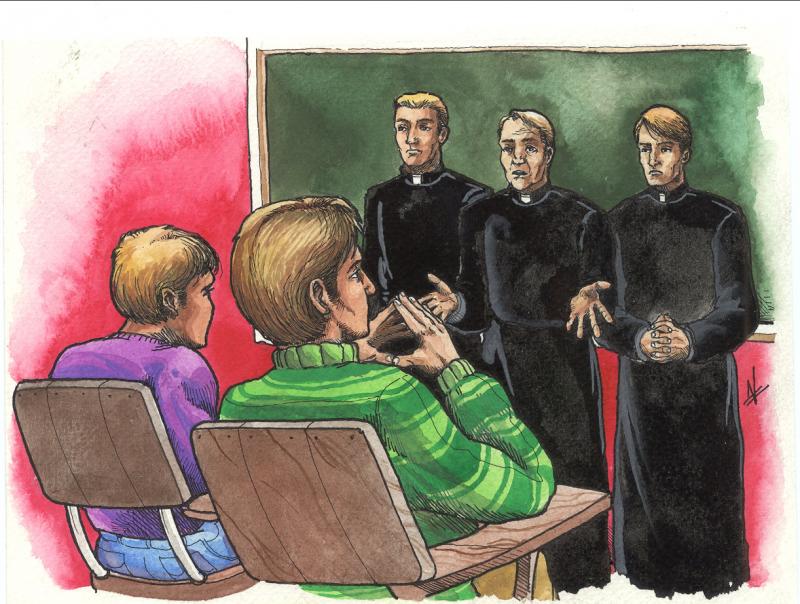
I was taught by Christian brothers and they came to us packed in black soutanes with half collars and mostly grim faces, and it seemed to be their mission in life not to bring joy to us scholars as we were called at that time – more often than not mistakenly. I suppose their teacher-training based itself upon the carrot and stick approach, but they probably got carrots so often in their college fees, which at that time were the lowest in town, and if they knew your parents were finding it hard they didn’t insist, nor did they noise it abroad. Also, they were men of integrity and dint waste time, though we often wished they would; and they were fair, they leathered everybody.
Unfortunately, the effect on me was to make me feel rebellious about absorbing knowledge, so that I would only do the minimum of homework in order to get by. Looking back now I think this was a mistaken since I’ve read an awful lot of books since then in order to improve my mind; but , who knows , in other circumstances I might have turned out to be a genius and become more unbearable than I am.
At that time my hometown, which was Omagh in Northern Ireland, was a great place for religious vocations, and some of my acquaintances were falling for the line handed out by vocations priests and brothers, who come to the school every year to talk about heir own thing. But not me.
In fact when the Columban man came around, although he was fine upstanding person, he turned me off. And he did it by reciting a poem as follows:
“O, who has a blade
for a splendid cause?
And who has a heart that’s true?
To live and to fight the grandest thing
that man could dream
Or singer sing, or ever soldier knew”
It was the ‘singer sing’ line that made me gnash my teeth. I mean to say did he really approve of the word-stringer that could be guilty of a line like that? Worse still, did the mission society that sent him expect to reel us in on a hook like that?
Even at the risk of missing cake and lemonade in the interview parlour I didn’t put in my name.
He got me in the end
But God is smarter that he looked in some of the bearded pictures of Him that abounded in my time, and He got me in the end. The Columbans used to publish a magazine called “The Far East” (a drab sort of thing with a Chinese junk on the front of it). It was distributed in school and I would take it home every month. All I would read is the funny bits at the back, but Ma would read it through – as she said “to get her money’s worth out of it” - she often suggested that the young ones and I should do the same, saying that “it might do you some good”.
The Far East
Anyway one day I was kept in after school hours to rewrite some essay that the English teacher found to be cryptic. My two pals hadn’t waited for me so I was dawdling home on my own and to occupy my mind I started to read The Far East which I was carrying.
The first article on the first page was an appeal for chaps to get ordained as priest and go on missions. I read it through, and it seemed to make sense. By the time I had arrived at the door of our house, I went inside and gave the mag to Ma and said “There’s The Far East. I am going to go to the seminary and become a Columban.” She went straight to the chair and sat down and said, “Good God! I don’t think I heard you right. Tell me that again.”
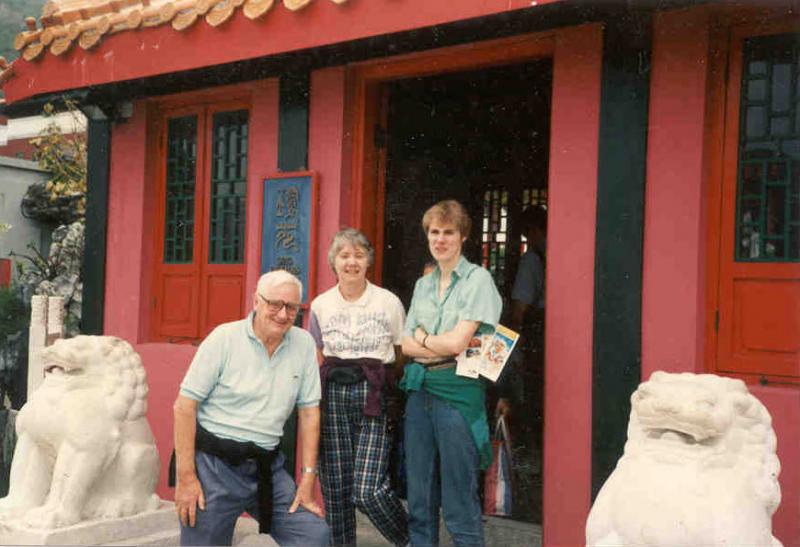
Disaster for the Columbans
I thought she might at least have patted me on the head and said “good man” but her tone of voice implied that she thought disaster was looming for the Columbans. But the thing is, we Bennetts are made of stern stuff and a maternal negative tone of voice would only serve to stiffen our resolve. But then again she might have known that. Ma could be very devious at times you’d never know what she’d be up to. Pa came home later, and when told of my noble ambition, remained quite calm and didn’t give me five pounds like I had half-hoped he would.
Two things got in the way
Looking back from here I suppose they were right. I still had another year to do in high school, and they probably thought I would change my mind a time or two before the final exams. But like I said earlier – stern stuff, etc. – we Bennetts stick to our guns. It must not be supposed however that things will always go easy for a guy about to embark on a religious career. Two things happened during my senior year which gave me a pause.
Firstly, a young maiden of proven virtue, with whom I had exchanged glances of mutual admiration, went away to teacher training college and began to write letters to me. Secondly, my youngest sister was born and quickly came to the conclusion that if she wanted her opinion to make an impression on four elder brothers and a sister, she would raise her voice – which she wasn’t loth to do.
These two matters affected my studies as follows:
Matter A
I became so interested in the weekly epistles of the trainee teacher that I couldn’t wait for the next one, and I spent lots of minutes, amounting almost to hours, composing even more interesting replies. When you consider that I had to get exercise (football, pitch and toss) to stay healthy, there wasn’t much time for fulfilling the home studies that the unfeeling teachers piled upon us daily.
Matter B
The young one arrived late on the scene and we all thought she was the greatest thing on two heels, so we began to rush home from school to get lifting her from her cot and passing her from one to the other.
On the way to the seminary
This exhilarated her no end, but when Ma put her down to sleep while the rest of us did our assignments, she raised very vociferous objections so that the decibel level almost prevented serious attempts to learn anything. The result in the end, however, was that the teachers became distraught and gave up on me figuring that I was doomed to fail the final exams anyway. Whereupon, I relaxed, began to listen to them sympathetically and to the surprise of all, myself included, passed the exams and was accepted in the Columban Seminary.
The virtuous maiden problem solved itself when her friend in the college said that she would also like to become my pen pal. I should have known that women couldn’t keep anything to themselves. My ardor for writing letters that could be published posthumously at great profit, suddenly grew cold leaving me time for other interests such as geography and history and English.
Get in there and stick to it!
The Columban Seminary at that time was bursting with students and was great in every way and I enjoyed it. But halfway through the course I made a strange discovery. Pa was trying to restart business after the war and I knew things were tough with them financially. So I offered to drop out and help to save the situation. I was surprised at the vehemence with which Pa said, “No dice!” He went on, “If you cannot hack the celibacy or the studies, okay! But if it’s just our hard times please don’t leave. Get in there and stick to it. Your mother and I and all of us are praying that you will make it.” This was a mild surprise to me. I hadn’t realized they were all that concerned about my vocation.
Preferably Columbans
In the seminary itself, which was called Dalgan Park, there was a priest who was a first cousin of my mother and who had married her to Pa in the dim and distant past. He was the college librarian and an unofficial spiritual director to some. He had never gone on the missions because of multiple sclerosis, he was popular with us students who lived for soccer football and indeed with all.
He never even hinted at it but it gradually was borne in upon me that he was very close to the Lord. I realized then that he had been praying for Pa and Ma, from day one, that they would have a son or two that would be ordained as Catholic priest. Preferably Columbans.
He got me and I’m glad He did
What more can I say? God had His eyes on me from the beginning, and He knew all along that He was going to get me, and I have to admit in this autumn of my life that I’m glad He did. It’s been a long trip but I met some great people along the way including God, and they all made it very enjoyable.
My advice to young chaps? If you know there is somebody around who is praying for you, watch out!
Requiem For A Rainforest
A word from the Editor Fr. Niall O’ Brien mssc
Recently I read a very beautiful book called Vanishing Treasures of the Philippines. In 1907 we had a rainforest cover of 70%. By 1992 it was down to 8%. And the sound of chainsaws still goes on. There are also maps of the island of Negros, equally depressing, showing a few tiny green spots in the north and in the far nothing else. Sad, sad. And still they chop with government approval. A future generation will surely weep over this and wonder what was wrong with us.

Hope from ordinary people
But there is hope and the hope, I’m sorry to say, is not coming from the government which still allows loggings and only has a selective log ban which is quiet incapable of stopping the cutting. The hope comes from ordinary people.
I had a visit the other day from Sr. Xavier Marie Bual, who is a nurse working in the community health apostolate of the Diocese of Malaybalay, based in Maramag with the St. Paul Sisters working at St. Joseph Hospital. She explained to me how the people in the area, using their Basic Ecclesial Communities, have risen up and tried to stop logging in Lanao del Sur. Now you know the forest in Lanao del Sur, one of the last forests in the Philippines, is absolutely essential for holding the water in Lake Lanao which feeds the Maria Cristina falls and thus supplies mot of the electricity for Mindanao. But it will immediately affect the area if it gets logged and, of course, it is being logged.
For over a year now, the people have been putting up barricades and stopping the logs going through. But what can they do when the big logging companies go to the leading politicians and get him to go to police and stop them? One bit of hope was when Defense Secretary Orly Mercado visited the barricade set up outside the hospital in Maramag on the main road, the Sayre Highway, from Davao to Cagayan de Oro. Mercado encouraged the men on the barricade to continue their struggle and to keep up the barricades.
Priest and Sister behind
The Bishop and the priests have been completely behind this specially since Fr. Neri Satur was assassinated by pro-logging agents. Many of the priests and sister have joined the lay people at the barricade throughout the year – ordinary people rising up and saying, “We’ve had enough, do not destroy our life.” “How can it be,” they say, “that a company owned in faraway Manila or Australia, is able to come in, destroy the environment on the basis of some legal document from Manila?” and then Manila rings its hand when mudslides kill hundreds like what happened in Ormoc and other places precisely because of the unabated logging. While we sit back and enjoy our cable TV and watch the horrors in other lands, meantime in our own land of the Philippines similar horrors are taking place.
Sayre Highway
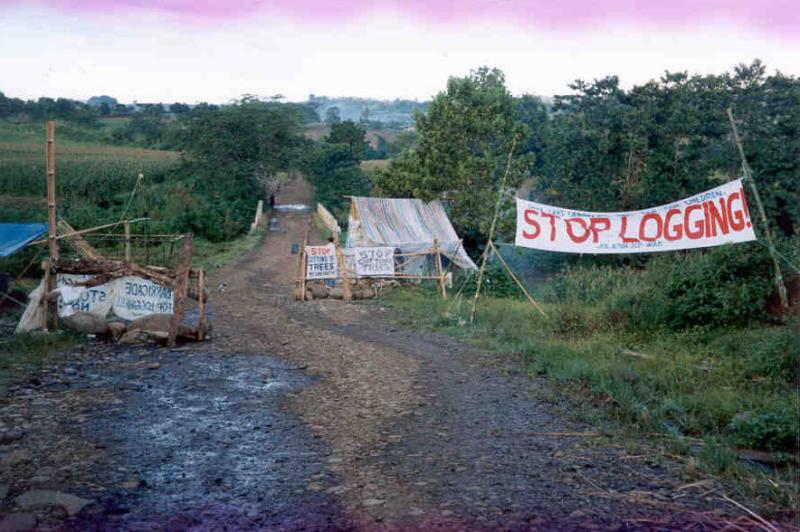
One of the many barricades which the people put up was as I said, along the Sayre Highway. Not many hours after Secretary Orly Mercado had encouraged the people, the police arrived at 3:00 o’ clock in the morning and removed the barricaded letting 22 trucks of immature logs go through. One of the priests, Fr. Benancio Balansag Jr. Lay down on the road in his sutana until four policemen lifted him bodily away. It was a symbolic and dramatic gesture and well worth it in my opinion. Because we’re not talking about trees, we’re talking about lives. The trucks rolled on the peace vigilantes who were taken by surprise stood there in dismay seeing failure written across the sky.
But not so. On their “over, over” handset they managed to contact some towns along the way and again and again the trucks were stopped. Again and again the politician intervened to try and facilitate the logging companies and get those trucks out but eventually they came to a halt a Barangay Kalabungay, Malaybalay City and in fact that’s where they remain to this day, awaiting a court decision because so much of the wood was cut from the wrong places and is under age (and that is going to happen always with selective logging because if there is one industry that is thriving, it is the industry of fake documents. How can an ordinary policeman along the road tell the difference between a fake and a genuine documents?)
Millennium Mass at the Barricade
At New Year’s Eve the parish priest of Maramag held the Midnight Mass at the place of the barricade, right out in the open and reminded the people that if they wanted a new millennium of hope then they must continue their nonviolent struggle to stop the forest of Lanao being destroyed by huge local and foreign logging companies, assisted by venal lawmakers in Manila. So many people attended the Mass that you could hardly see the end of the crowd. When the sun rose on the New Millennium in Maramag, it shed beams on simple people determined to save their land nonviolently. Meantime you will be glad to hear that those logs, the 22 trucks, stand still silently in the City of Malaybalay as they await a court decision.
Spare a thought
For those of us lolling on our soft chairs, watching cable TV, spare a thought of the simple people of Bukidnon sleeping out at night on dirt floor and cement in the hope of stopping the on-going destruction of their forest, of their life.
P.S. The name of the book again is Vanishing Treasures of the Philippines Rainforest by Lawrence R. Heaney and Jacinto Regalado Jr., produced by the Chicago Field Museum, Roosevelt Road, Chicago Illinois, USA.
Second Thoughts?
By Sr. Eden Peñanueva op
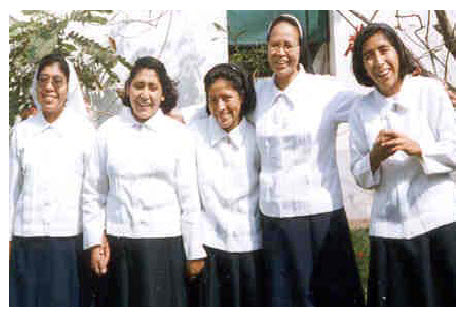 In 1987, my Dominican Superior invited five sisters to apply for the missions so I immediately applied but I did not get a positive response, instead I was assigned to help in the novitiate for almost three years. I resigned myself to the Will of God, but I made a secret promise to him: “Yes, I will forget this desire. However if there will be an opportunity to work in the mission one day, I will never say no.”
In 1987, my Dominican Superior invited five sisters to apply for the missions so I immediately applied but I did not get a positive response, instead I was assigned to help in the novitiate for almost three years. I resigned myself to the Will of God, but I made a secret promise to him: “Yes, I will forget this desire. However if there will be an opportunity to work in the mission one day, I will never say no.”
A God of Surprises
During the general Chapter in July 1990, Sr. Anne Marie Salomia, op who was assigned in Peru for almost one year was elected as one of the General Councilors in Canada and they needed one to replace her in Peru. So my Regional Superior, Sr. Bonifacia Tecson, called me up from Canada to ask if I was still willing to go to the missions. In was tongue-tied to hear such a question by phone. The saving factor was my secret promised to God. After a minute I said to Sr. Tecson, “Yes, I am willing.” That’s how it began...a yes to Him, the God of Surprises.
Second Thoughts
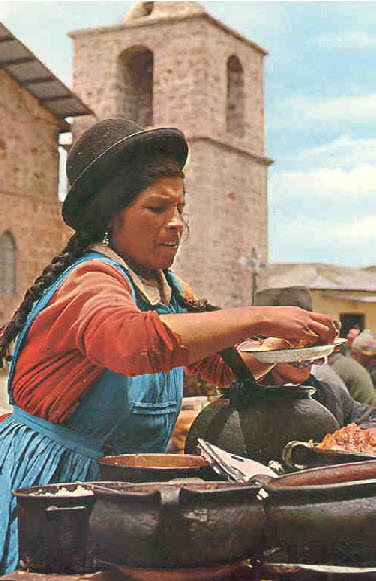 Looking back at my first two years in Peru, I now realize just how ambivalent I felt. Peru was more dangerous than I had expected. Should I go home or stay and take the consequences? One of the important factors when encourage me to going in the apostolate in the elementary school was the support of the teachers. When they knew that our lives as missionaries were in danger, they offered to accompany me in going to and coming home from school. Their support was a proof of God loving care and protection.
Looking back at my first two years in Peru, I now realize just how ambivalent I felt. Peru was more dangerous than I had expected. Should I go home or stay and take the consequences? One of the important factors when encourage me to going in the apostolate in the elementary school was the support of the teachers. When they knew that our lives as missionaries were in danger, they offered to accompany me in going to and coming home from school. Their support was a proof of God loving care and protection.
Learning Experiences
This was the time of the Sendero Luminosa, one the most violent revolutionary groups in the world. Many missionaries were killed. I frequently felt afraid in those times; but I was strengthened by the unity and support of the people I was working with. In those dangerous situations I became aware of the presence of God. I thank Him because it helped me see His guiding hand and His will for me. He made me strong and I have gained self-confidence and total trust in His providence in the midst of danger. It really changed my outlook on life. Words are not enough to describe such feeling of gratitude to Him who called me.
Story Of A Boat Person
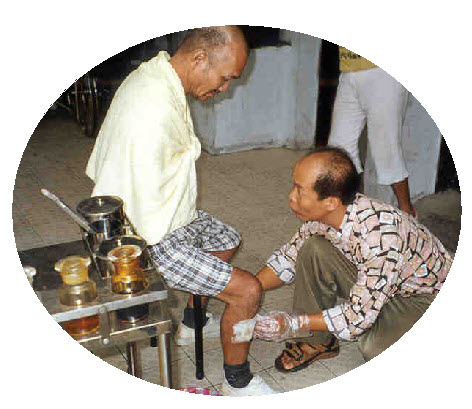 Q. To begin, could you tell us a little about your personal background?
Q. To begin, could you tell us a little about your personal background?
A. I was born in a little town called Binh Tuy, South Vietnam, in 1958. I have five brothers and two sisters. My parents, natives of a very strong Catholic village, fled from North Vietnam, in 1954.
Q. How did things work out for them?
A. Those who came from the same village in the North had a Catholic priest as leader who established a new settlement for the refugees. They turned this very poor, dry area of Binh Tuy into fertile farmland.
Q. What kind of memories have you from your war-time childhood?
A. They could be divided into three stages. The first was up to 1975 when I was becoming aware of something terrible happening around me. A very strong memory from that time is the funerals of so many young men in our villages. They got killed in the fighting. I remember seeing so many young wives and little children crying. Then at night there were the explosions and the fires; so often I had to run for cover with my family.
The second stage was 1975, the year South Vietnam was invaded by the North. I have terrible memories of flesh exploding and decaying; finding the leg of a soldier on the roof of our house; the awful smell.
The third stage was after 1975; supposedly peace time. I saw a lot of fathers arrested and taken to re-education camps. None of them returned home. I remember the fear at night when we’d hear a dog barking. In the morning someone would have been taken away from the village and sent to a camp. After that a lot of people began to try to escape abroad.
Q. How about your own family?
A. My father had been the captain of a ship but he resigned because he could not bear the threat of war. He became a taxi driver. He died when my mother was 38; 1 was 17. We all had to work to help her. She would buy small fish and cook them over charcoal and then take them to Saigon to sell. I myself became a fisherman. When the sea was rough I worked on the land.
Q. Eventually you decided to escape?
A. The Communists didn’t like us because we were Catholics. They labelled us as anti-revolutionaries. My family grew poorer because we could not get jobs. I tried to continue my education. I had to walk about eight kilometers to school every day for two years. Generally I ate nothing until I came home in the evening. One day on the way back from school I was arrested and taken to the police station; I didn’t understand why. I had done nothing wrong. This experience had a deep effect on me.
Then Vietnam went to war with Cambodia. We had just finished one war and now started another. Four of the boys in my family were of conscription age. I felt I had two options - flee to the forest and join the others, or escape abroad and speak up for my people.
This was 1979. Escape was costly. You needed three ounces of gold for each person. My family did not have this because my father had been ill for three years before he died.
At that time I was working as a fisherman. I spoke secretly to the owner of the boat and told him I wanted to escape. He told me he too wanted to escape. Because I had been with the Benedictines for some time he trusted me. After six months planning all was ready. Not everything went according to plan. My uncle took his girlfriend without telling us beforehand. He hid in the rice fields with the girl and a lot of dogs began to bark; we were scared we would be caught. That caused mistrust in the group. Eventually by some miracle we got away. I know that without God’s help it would never have been possible.
Q. Where did you hope to go to?
A. We just wanted to get out of Vietnam, we did not know to where. That first night on the boat was frightening. The sea was very dangerous. I vowed that if we failed I would never again try to escape by boat. Our plan had been to take 40 people but eventually there were 56 people in a 24-foot boat. During the night many ships passed but they ignored us. The first ship we saw in daylight was a Norwegian merchant ship called Mundogas Atlantic. We followed it for an hour but our engine could not cope with the speed and we had to give up. After a while, to our delight, we saw the ship turn around and come back. They took us on board.
Q. Did you ever find out why they changed their minds?
A. Apparently it was the captain’s wife who persuaded them. After that the crew were very kind to us but she was particularly kind, washing our clothes and looking after us. That same night there was a fierce storm. We would all have been drowned in the boat.
Eventually we arrived in Japan. None of us had paid money to anyone. We simply trusted in God and in each other.
Q. How many of your own family made their escape in the boat?
A. Three brothers, four uncles, two aunts and three cousins. In Japan we were sent to two refugee camps. Misono refugee camp was in Fujisawa close to a parish where the Columbans worked. This is how I came to meet Frs. Cathal Gallagher and Brian Vale. After nearly three years in Japan I decided to join the Columbans to become a missionary priest.
Some years previously, when I finished my high school education in Vietnam I had joined the Benedictines. At the time no one was allowed to live in a village other than their own. So after six months the local communists kicked me out and I had to go home. I gave up the thought of being a priest. While in the refugee camp in Japan I talked again with Cathal about the possibility of becoming a priest. I had already obtained a visa from the Government in Norway and was about to go there with my family. I took time to think things over and talked with my brothers. It was a big decision as it meant that I would be alone, something very difficult for one who comes from a close-knit family.
Q. Why did you opt to become a missionary priest rather than a priest based in one country?
A. Seeing what the Columbans did in that refugee camp impressed me a lot. Cathal was the first one to go there and befriend people. He communicated with us by body language; he ate what we offered him. He joined us in singing and played with the children. All
that was important to us Vietnamese. He brought a big group of Japanese to the camp to befriend us. He then started a campaign to raise funds to refurbish the camp. Like the rest of us he went out on the street with a collection box. After I joined and experienced something of missionary life I began to like it. My life became more meaningful and colorful and freer. I liked being able to work with the poor, to be free from an over-traditional church.
Q. Taiwan, your present assignment looks like a pretty difficult place for a missionary?
A. It is difficult for those who go there with the sole purpose of getting people to convert to Catholicism. But it is not difficult if you are ready to go into areas where the marginalized and down- trodden are. And there are plenty of them. My first ministry in Taiwan was working with homeless people in Taipei, in Chung Ho. When I first got there I could not believe that such a place existed in Taiwan. The smells were hard to take. But something told me that this was the place where I should work. I ended up working there full time.
About half the people were mentally handicapped and there were a lot of psychiatric cases and some physically handicapped adolescents. About a third were normal elderly people. It was really a detention centre. After a difficult beginning, the administration eventually accepted me and gave me freedom to work as I wished. I never ‘preached’ but after a time I found that I contributed to an improvement. Some corruption was exposed and a new administration took over. God works in mysterious ways. Presently I work there one day a week. My relations with them and their relations with one another are good.
Is Taiwan difficult for a missionary? It depends on how you see your own role and on how you go about trying to give witness to God’s love. When and if people are ready to believe in God they come forward.
Q. Have you ever been able to revisit Vietnam?
A. No because I am under suspicion as a human rights activist. I have spoken and demonstrated both in Japan and Australia for the rights of the Vietnamese and I am blacklisted. I’d love to go home, to do something for my own people. I have a dream of helping the home- less and handicapped children in Vietnam in the future. I now have the gift of freedom and would like to do something to bring that gift to the Vietnamese people.
The Book Of Slave Marks
By Fr. Cyril Lovett mssc
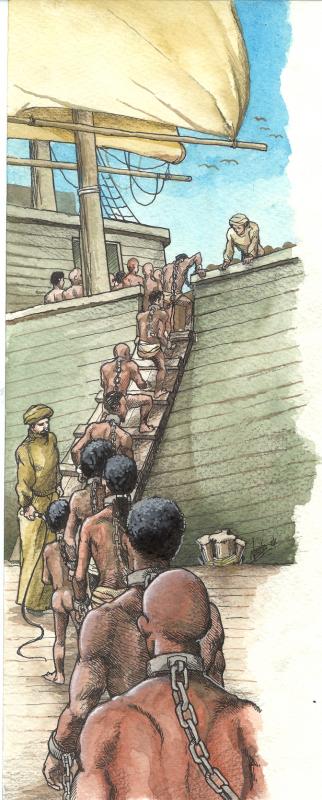 From time to time we come across a book or document, from another age, which moves us. One such Brazilian document that moves me profoundly is known as the Book of Slave Marks. It is a register of more that fifteen hundred slaves, their baptismal names, nation of Origin, sex and approximate age, as well as the marks with which they were branded and the part of the body on which these marks were inflicted.
From time to time we come across a book or document, from another age, which moves us. One such Brazilian document that moves me profoundly is known as the Book of Slave Marks. It is a register of more that fifteen hundred slaves, their baptismal names, nation of Origin, sex and approximate age, as well as the marks with which they were branded and the part of the body on which these marks were inflicted.
This is an extremely rare document. When, in 1888, Brazil finally abolished slavery, it had dubious destruction of being the last country in the world to do so. One of the official actions that followed almost immediately was the burning of all the documents to do with slavery – a kind of national effort to wipe out the memory of one of the most shameful episodes of Brazil’s history. This Book of Slave Marks is one of the very few documents that survived.
All the names in the book are written in the same hand. We do not know why this list was composed from the original documents. It may have been merely a bureaucratic task or it may have been some impulse of pity or shame at so much pain inflicted on human beings. In support of this latter interpretation is the fact that the scribble highlighted in inverted comas the suffix “dor” meaning “pain” in the little of the ships – the “Especulador”.
Chains of Slaves
The process of marking the skin of the slaves with a red-hot branding iron was one of the cruelest aspects of slavery. Men and women were hunted down in various parts of East and West Africa where the Portuguese held sway. Among the nations mentioned in the document are the Benguella and Quillimanos, who were of Bantu origin from the coasts of Angola and Mozambique. They were marched long distances in chains and finally herded together in sheds in the port cities where they awaited transport to Brazil.
There they were branded with the particular mark or monogram of a number of Brazilian slave importers. The brand was applied to a part of the body which was easily visible – the arms, shoulders breasts or thighs. Its purpose was to facilitate recognition of the slave on disembarkation in Brazil and, more importantly, to identify and track down runaway slaves.
Human Merchandise
These were not only brands that were applied to these unfortunate people. A brand in the form of a cross applied to the arm signified that the royal taxes had been paid and a small cross branded on the breast was the clear indication that a slave had been baptized, albeit with a minimum of instruction, in Africa before embarkation. All these brands marked a slave as a form of merchandise, an item of trade.
Portuguese navigators frequently engaged in triangular from of commerce. They brought iron, bars, bales of cotton, and tobacco to Africa where they were bartered for slaves. This type of exchange for pieces of cloth was so common that slaves also were often referred to as pecas or pieces. On the return voyages the ships would be stocked with produce from Brazil particularly tobacco andaguardente-locally brewed spirits.
Dreadful Voyage
No attempt was made to keep families together. In fact, on reaching Brazil every effort was made to separate families and members of the same tribe in order to reduce the danger of insurrection. Conditions on board the slave ships were so dreadful that from ten to fifteen percent of slaves died en route. The voyage lasted a minimum of two months from East Africa and three months from Mozambique. On some of these ships more than a half the slaves were infants and children.
Campaigns to end Slavery
The beginnings of the campaign to abolish slavery have a connection also to this Book of Slave Marks. Britain became the great advocate of abolition in 1807 in spite of its vigorous participation in the slave trade up to that date. It was a time of strong humanitarian and philanthropic discourse. There were other concerns, too, notably the need to boost the product of the industrial revolution in the colonies. As long as cheap slave labour was available nobody was interested in substituting machines for slaves. Also, once Britain abolished slavery in its own colonies it was at an economic disadvantage with competing nations such as Brazil and Cuba who continued to use them.
Slave Trafficking
So, at the beginning of the last century much of Britain’s diplomatic efforts were directed to ending slavery. Portugal, under pressure from the Napoleonic invasion, signed a pact with Britain guaranteed the safe conduct of the Portuguese royal family to Brazil. In return, Portugal promised to gradually promised to gradually phase out slavery. In 1817, a further treaty restricted the Portuguese slave traffic to African ports of its colonies south of the Equator. With Brazil’s political independence in 1822 this treaty lost its effect but Britain, still on the diplomatic offensive, agreed to recognized the young monarch in return for a promise to abolish slave traffic. Change, however, was slow in coming as Brazilian slave owners demanded more slaves. By 1830 a joint Anglo-Brazilian Commission had been set up to judge any ships captured in the trafficking of slaves. It functioned spot radically depending on the strength of the Royal Navy at any given time, but illegal traffic went on unabated. In the period 1839 to 1841five vessels, the Ganges, Leal, Asseiceira, Especulador and Paquete de Benuela were captured and more than fifteen hundred slaves, whose names are listed in The Book of Slave Marks, were set free.
In fact, however, the law required them to serve fourteen years as “freed workers” either in public service, or rented out by state to an employer. They became a much sough after source of cheap labour, and by supreme irony, these “freed workers” were often treated more harshly than other slaves. The records available show that many of them died before they completed the fourteen years. And for those who survived and petitioned the Crown for their promised freedom, some other excuse was always found for refusing them. There is no evidence that any were set free.
Gift for Living
Today, we who work or have with the descendants of these and other African slaves in Brazil, can see some of the results in this traumatic experience. On the negative side is the generally low self-esteem of the black population; the persistent, subtle and not so subtle, efforts to maintain them as an inferior class; their lack of unity, political consciousness and a sense of their own history; the weakness of family values; and deplorable levels of racial prejudice. On the positive side, much that is most distinctive in the Brazilian culture – its most unique dishes; a vibrant Afro-Brazilian religion – Candomble – which has survived and thrived in the midst of endless persecution; the people’s gift for living the present moment; and their capacity to endure incredible hardship and suffering with Christian hope, are also part of the heritage of so many, who, like those listed in the Book of Slave Marks, endured the tortures of slavery.
Their New Home
By Fr. Gilbert Sales cicm

Father Gilbert Sales, cicm is the District Superior of CICM in Mongolia and also the Director of the Verbist Caring Center. The center is a Catholic home for street children in Mongolia’s capital, Ulaanbaatar. Father Sales is pictured here with the youngest resident of the center and two other children, who like the 70-plus other residents, benefit from this ministry which is partly funded by donations from benefactors of Missionhurst.
During one of my Wednesday visits with the street children, two children caught my attention. They were Oxinoo and Banda, three-year-old brother and sister twins they were tagging along with their mother who had who had come for meal. What struck me particularly was that these two children appeared spiritless. They had bloated stomachs and a strange look in their eyes. They clung to their mother, obviously looking for security.
Living in Sewers
I learned that they had been forced out of their dwelling and were now living in sewers. They had become victims of the recent political and economic restructuring in the country, which has eliminated long established free social services, childcare, nurseries, kindergartens and milk kitchens. Oxinoo and Banda are only two of many street children.
The street children of Mongolia have received quite a bit of attention lately, not only in the Mongolian Parliament and government agencies, but also from non-government organizations and even the international communications media. The Catholic Church, though small and new in Mongolia, has together with the above-mentioned bodies raised the question: what can be done?
Not just visits but shelter
The Catholic Church in Mongolia started working with the street children in 1994. At that time, were simply visiting these children in 1994. At that, we were simply visiting these children in the places were they normally gathered in the evening. We would bring them hot tea and some food. We also provided first aid to those with wounds. And brought those who were very sick to the hospital. We would spend time with them in friendly conversations, trying to gain their trust and confidence. After a year of regular contact, it became clear to us that these children badly needed a shelter. The winters are cold here and food is scares during the long winter months. It is a time the street life becomes very tough as gangs rule different parts of the city. In August 1995 the Catholic Church in Mongolia decided to open a shelter for street children. The center started its operation by distributing food, lunch and supper to the few street children. In no time the numbers grew to more than forty. Once the five small rooms of the rented building were fixed and furnished, the center started accepting children to stay and sleep there.
The beginning were hard
Kids coming from different gangs started fighting with each other, breaking windows, and using bedsheets for cables to go up and down through the windows. We were forced to review our policy of acceptance. Consequently it was decided that we would accept only younger children, the sick, and girls for overnight stay. Since then the center has become as safe haven for children from ages two to twelve.
When the 1995-1996 school year started we began sending the children back to school. The younger children were enrolled in kindergarten. The older ones had to take qualifying exams to determine their level of literacy, and were enrolled at different levels accordingly. One of the main goals of the center has been to bring these kids back to the mean stream of society. This is not an easy task. Some schools, upon learning that the children, were former street children, were unwilling to enroll them. Often once they were enrolled, classmates would mistreat them on account of their background. Regular contact with both principals and teachers was needed to make them understand the plight of these children.
Their new home
We are five years further down the road now and we’re pleased with the result, thanks to the close supervision and counseling by the center has steadily grown. The rented building we first had became too crowded. We needed to be able to move around and have an atmosphere conducive to studying (especially in winter when the children have to stay indoors most of the time). So, it was decided in1997 to look for a bigger and more comfortable place. With the help from benefactors around the world, we were able to find a suitable place to house the growing number of children in our care.
The news home is called VERBIST CARING CENTER, in honor of Theophile Verbist, founder of the CICM Congregation who worked with orphans in Inner Mongolia, a province of China not to be confused with Mongolia which is an independent country.
AT present we have more than 70 children at our center. It is our hope that this center will eventually open a facility that will train and educate the teenagers in the streets in carpentry, dressmaking and other vocational courses.
Oxinoo and Banda, no six years old, and very happy in the company of the other children in the Verbist Caring Center. They have been here now for three years. Staff members help them spiritually and psychologically and their self-confidence is growing. It is our hope that he children in our care find hope in the loving, caring and understanding atmosphere her at the Verbist Center.
One of the main goals of the center is to bring these children back to the mainstream of society.
Salamat Missionhurst!
To Search is to Find

We do not have the answers to every question –but the very asking of the question is the beginning of the answer. So why don’t you send us your questions and let us together find the answers to our question.
you send us your questions and let us together find the answers to our question.
No Christianity Without Community
I have been told that I must go to Mass only in my parish church. Why is this?
Answer: it is preferable that you go to Mass in your local parish church precisely because in that way you will take part in the community. Mass in your local parish church precisely because in that way you will take part in the community. Mass is community worship and it implies also the involvement in the building of a local community. However, one fulfills one’s obligation by going Mass anywhere. Now that people in the cities us cars they have a habit of choosing a parish which suits them and enrolling in that parish. What is important is that you should not be just Sunday Mass Catholic but that you should be involved in the community. No Christianity without community.
P.S. If your parish is dead with nothing going on, you might be wiser to choose a different parish.
What Does John’s Gospel Say?
My friends in the office belong to a church which does not believe that Jesus Christ is God. In fact they have many quotes from the Bible to back this. One, for example, “The father is greater than I” from John’s gospel.
Answer: Good that you start from John’s gospel. John’s gospel is the most explicit of the four gospels in insisting that Jesus is divine. Take the opening words of his gospel. “In the beginning was the Word and the Word was with God and the Word was God.” the best scholars accept the fact that right through John’s gospel, again and again, he insists that Jesus comes from God and is divine. You recall the word of St. Thomas when he fell down and adored him saying, “My Lord and my God.” As for the phrase, “The Father is greater than I”, that comes from the Last Supper discourse and refers to God the Father, the, first person of the Blessed Trinity who obviously, is greater than Jesus, taken only as the human Jesus. After all when Jesus became a human being he didn’t just pretend to do this. He actually did int. so in his human state he could clearly state that “the Father is greater than I”.
The danger is taking any text one line at a time. If you take the whole of the gospel of John from beginning to end, there is no doubt whatsoever about the author’s conviction that Jesus is divine. Even scholars who are not believers accept the fact that this was the intention of the author of that book.
P.S. The Jehovah Witnesses, who do not believe that Jesus is divine, have their own translation of the Bible and their own translation particularly of the first verses of St. John’s gospel. The best translation to follow is the New Revised Standard version, generally considered by scholars to be the most correct.
Division of Diocese
Our Diocese has a great division between some of the priests and the bishop, it has us all worried, what can we dot to get them to be united?
Answer: You are right to care. The Church is the people, not just the bishop and the priests. It is normal in any group engaged in something as serious as the Church’s mission to find themselves disagreeing in many ways. The bishop has been placed there as a sign of unity and as an instrument of unity in the diocese. He has a delicate job of working to bring about unity. Pray for him in his task and avoid taking part in factions and have the quiet courage to tell either side your truth, other than taking sides and making the situation worse or letting each party hear only what they want to hear. There are always two sides to a story.
No Youth Groups
Our parish has lots of Catholic organizations such as the Legion of Mary, Couples for Christ, the Knights of Columbus, the Catholic Women’s League. But almost nothing for young people. As a result very few young people are involvement in our parish.
Answer: That’s a pity because some 50% of the people in the Philippines are under the age of 15. The Student Catholic Action is a good organization for the young students but, of course, it is not parish-based and only covers those in college. It’s a pity that so many parishes have let go of their Knights of the Altar Associations. Can I suggest that you approach your parish priest and ask him to start something specific for the young? Maybe the Singles for Christ might be what you are looking for...and maybe you can help.
Virgins Only?
Can someone who is not a virgin become a priest, a monk or a sister?
Answer: Yes, of course. Manu widows or widowers become sisters and priest. St. Augustine who became a bishop was a notorious playboy in his youth. There is hope for all of us. And anyway, sins of the flesh are not the greatest sins. However, sisters and priests are called not only to a life of celibacy but to a life of chastity.
PIUS XII: The Scarlet and the Black
There have been a lot of reports in the papers recently about Pope Pius XII, saying that at the time of the Holocaust of the Jews in the Second World War he did not do enough to help the Jews. Is this true?
Answer: Nobody did enough. That’s certain. It is easy to judge people on what they did and hard to judge them on what they did not do. As regards to what he did there is no doubt that Pius XII did a lot for the Jews of Rome where he lived. He is responsible for saving more than 5, 000 Jews because of his personal intervention. This appeared in an important book called Never Again: A History of the Holocaust by Sir Martin Gilbert. But there were Church interventions all over Europe for the Jews. So much so that the chief rabbi of Rome became a Christian at the end of the war in gratefulness of the efforts of Pius XII.
However, the Christian treatment of the Jews throughout the centuries has been deplorable and anti-Christian and it led ultimately to the Holocaust. As head of the Catholic Church certainly Pius XII then takes some of the blame. We are sure that he did a lot for the Jews. Did he do enough? It’s good to remember that in the case of the Jews in Holland where the bishops spoke out strongly in favor of the Jews, their public protest created a double reaction by the Nazis against the Jews and the worst persecution of the Jews took place in Holland; Pius XII would have been very aware of that. A public polemic condemning the Nazis my have gained him popularity but would probably have created the sort of back lash that took place in Holland. Did that make him wisely told back? We really would have to know his own inner mind to answer that.
Meantime, archives are being ransacked by the protagonists on both sides, so the verdict remains out.
Land Reform and Politics
The Church in the Philippines seems to be behind the land reform in the Philippines. Is this universal Church teaching or just a political position of the local Filipino Church?
Answer: No. the teaching on land reform in the Church has been explicit Church teaching since the Second Vatican Council. But even before that, in the time of Pius XII h laid down the conditions very clearly about the meaning of the possession of land. He made the famous pronouncement* that the goods of the world were given for all and that private ownership is a means whereby this may be attained but when private ownerships becomes an obstacle to this, then some form of land reform becomes necessary. Of course, he refers to genuine land reform.
*Radio message, Pentecost 1941
PS Send your photo with your question. If we print your question, we’ll print your photo, too.
Who Will Separate Us From The Love Of Christ
By Fr. Jools Amamangpang, msp
Recently Fr. Jools Amamangpang, msp had several scrapes with death. It got him to reflecting and he shares his reflection here.
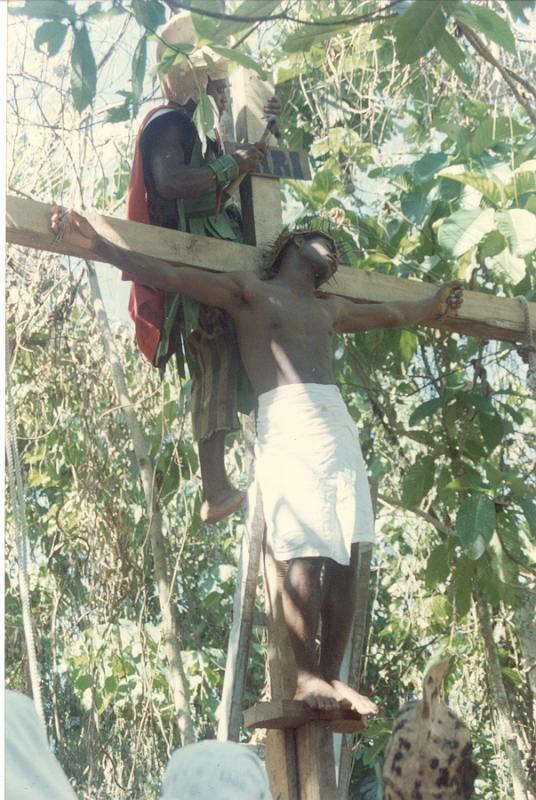
From time immemorial many people wonder whether there is life beyond the grave. Philosophers, sufis, pundits, monks, (and even sorcerers, I guess!) tried to provide a shadow of hope that eternal life is possible. For others who don’t acknowledge that life hereafter is possible, death is a frightening reality and a major cause of anxieties and uncertainties.
Resuscitation or Resurrection?
For Christians who fully accept that Jesus is Lord, death is not final but only a transition to a fullness of life. This holds true if by saying that “Jesus is Lord” one puts no limits to this dominion and includes death in it. “Christ must reign until God has put all enemies under his feet, and the last enemy to be destroyed is death.” (1Cor. 15:25-26) St. Paul, in his letter to the Romans, made it clearer when he said”...if you confess with your lips that Jesus is Lord, and believe in your heart” are synonymous. “That Jesus is Lord” and “that God raised him from the dead” mean the same, because Jesus lives a life over which death no longer has any power. Here one can find a vital difference between the resuscitation of Lazarus and the resurrection of Jesus!
Three brushes with Death
In this season of Lent, Christians are called to reflect on the Lord of Jesus. St. Paul beautifully describes it by saying: "None of us lives as his own master and none of us dies as his own master. While we live we are responsible to the Lord, and when we die, we die as his servants. Both in life and in death we are the Lord’s. That is why Christ died and came to life again, that he might be Lord of the dead and the living.” (Romans 14:7-9)
That Jesus’ Paschal victory has very pertinent consequences in my personal life and also for my death. It has become very real for me recently. The reason is very glaring: for the month of February alone thrice I have had near-death experiences.
Who will separate us?
As a Christian I believe that death separate me from Jesus over any power in this world: “Who will separate us from the love of Christ? Trial, distress, persecution, hunger, nakedness, danger or the sword? I am certain that neither death nor life, neither angels nor principalities, neither the present nor the future, neither height nor depth, nor any other creature, will be able to separate us from the love of God that comes to us in Christ Jesus, our Lord.” (Romans 8:35, 38, 39)